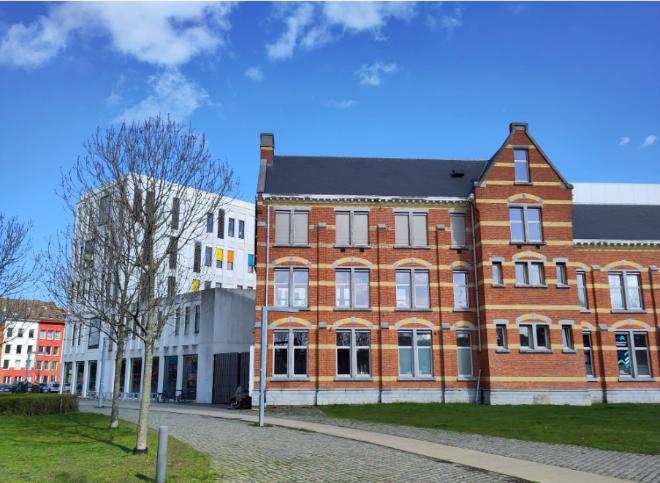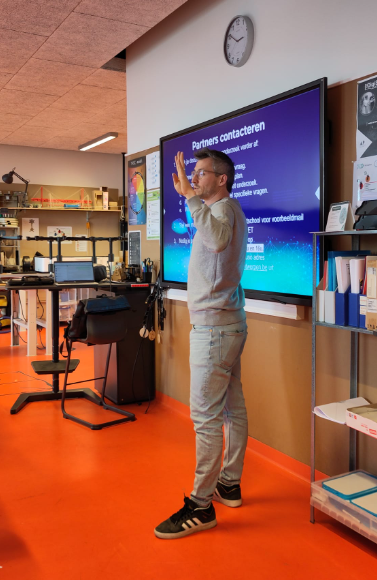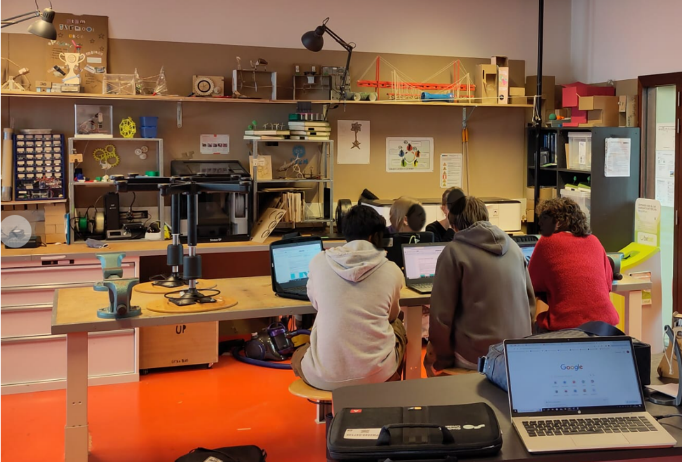
SSIBL is a didactic approach to science education that has three distinct phases: asking questions about socio-scientific issues (ASK), conducting research to find answers to those questions (FIND OUT) and moving into action to take steps forward (ACT). Within the COSMOS project, we go one step further and deploy SSIBL as a methodology to engage in open schooling. An important aspect of this is that teachers, pupils and actors from society work together on the socio-scientific issue. They can do so within one or any phase of SSIBL, and a key challenge is therefore to identify and engage with these societal actors.
Novaplus, a specialised urban STEM school in the city of Antwerp (Belgium), has developed its own approach to this. In this blog post, we reflect on how teachers Simon and Sasja, the Novaplus COSMOS team, go about connecting societal actors to the learning process of their students in science education. Novaplus is participating in COSMOS for the second year. Last year they were one of the project's pilot schools, and this year they are building on those experiences. Simon and Sasja both teach a STEM course to pupils in the third year of secondary education (grade 9, so 14-15 year olds). For Novaplus, student initiative and self-leadership are central pedagogical principles, which is also reflected in how they engage with societal actors in COSMOS.


For Novaplus, COSMOS is a semester-long project. At the start, the teachers chose a broad overarching theme: 'the green revolution'. Under their guidance, students then explored the theme and identified topics that engaged them. Topics they want to know more about, that fascinate them so much that they want to work on them for several months, and in which they want to make a difference. In small groups, the pupils came up with themes such as healthy and sustainable nutrition, effects of light on the mental well-being, effects of (too much?) sport on the health of young people ...
In COSMOS, as part of its open schooling approach, all schools work together with societal actors to explore themes further, to co-research and co-design actions. Simon and Sasja took their own approach to this, in line with their school's pedagogical vision. First, they encouraged pupils to further concretize their own themes: what is it exactly they want to study in their SSIBL project? What do they already know, what are still gaps? Based on this, the teachers then went on to look for societal actors who can be meaningful in the students’ learning process. For each group, they identified a partner: varying organizations such as the data service of the local government, a psychology professor, a dietician... The teachers did an initial briefing with these experts on the purpose of the COSMOS project and introduced them to the students' initial ideas.
The next step is for the students to engage in dialogue with the experts. To this end, Simon and Sasja coach them in two areas. First, they get the pupils to even further concretize their research theme: they work out an initial research question (ASK), make a first attempt to plan their research (FIND OUT) and also explore initial ideas for actions they could set up with the results (ACT). This also includes explicating their own motivation for asking exactly these questions, as a form of personal inquiry. The teachers also let their pupils think about what they want to get to know from their experts: do they want them to help refine their research question? Are they looking for specific data to answer the question (scientific and social inquiry)? Do they need help with their research plan? Do they want to set up actions together? The students work out a set of questions and discussion points around which they will later engage with their experts.
Then it is also up to the students themselves to make contact and inform their expert about their plans, inviting them to a consultation meeting. Pretty exciting for 14-15-year-olds: they have to make an agenda for the meeting, book the appointments, produce meeting notes, make sure they are getting what they need. Currently the students are preparing for these meetings, which will happen in a couple of weeks. We are eager to see how these will go and what impact they will have on the students and their SSIBL plans, but also on the experts themselves. After all, they will enter into dialogue with young people who see in them a partner for research they care about. A lot to learn for everyone! At the end of the school year, there will be an apotheosis and the students will present their actions to everyone involved in COSMOS in and around Novaplus. We can’t wait.


